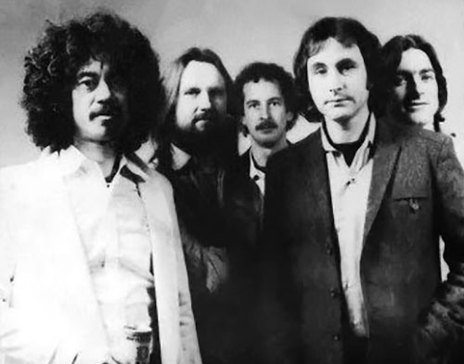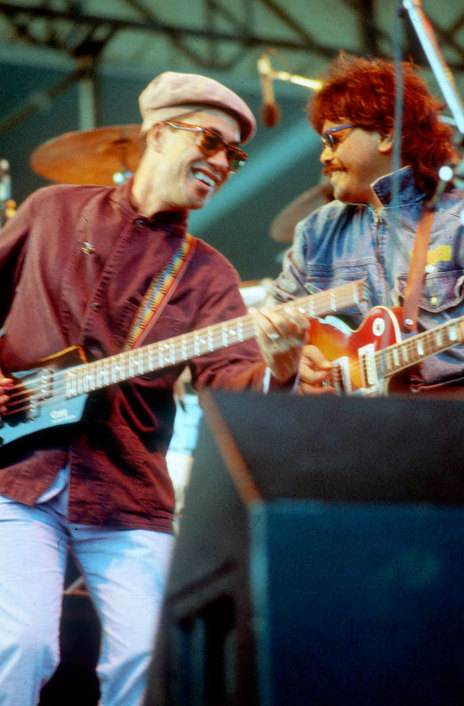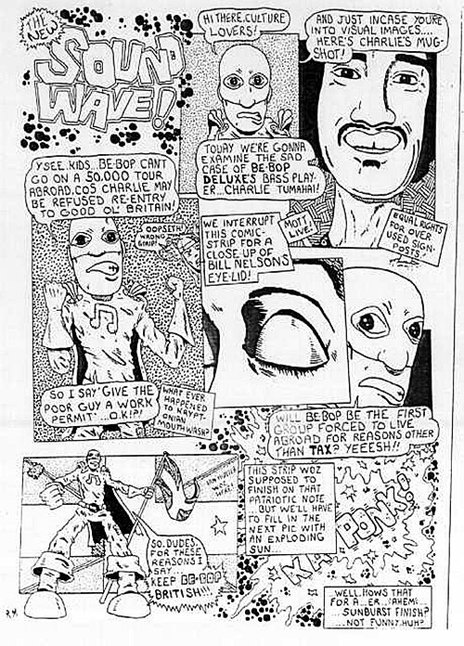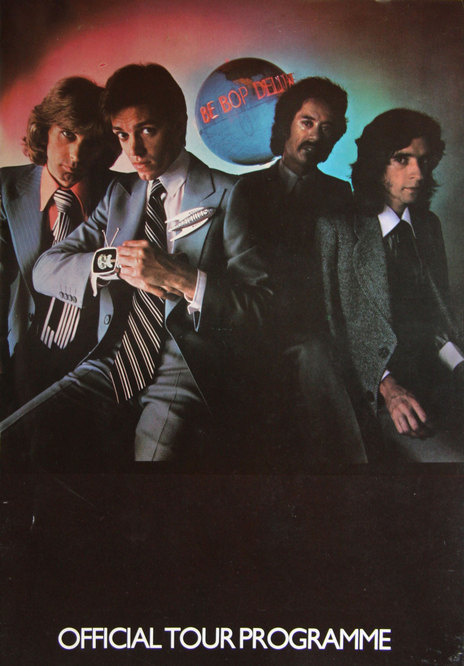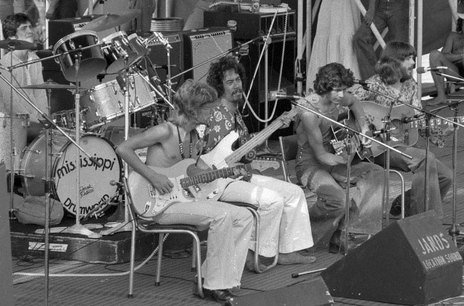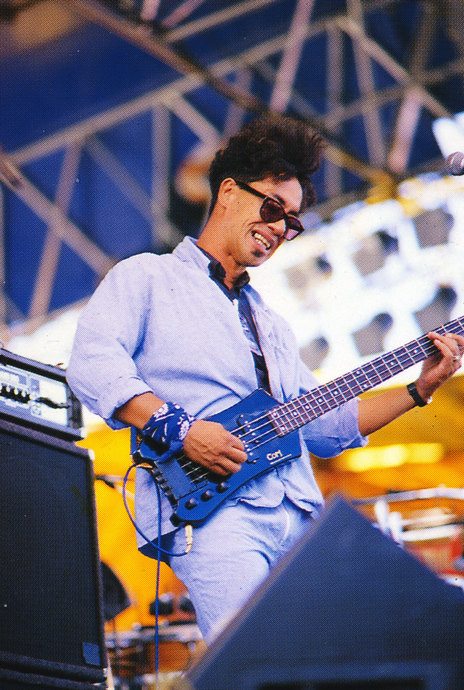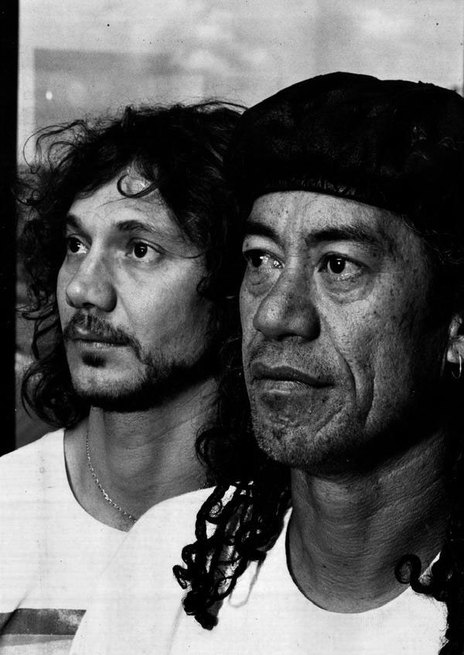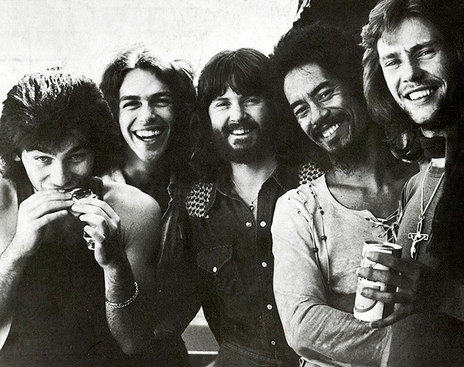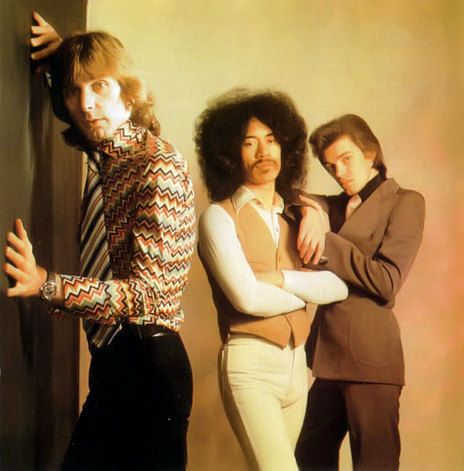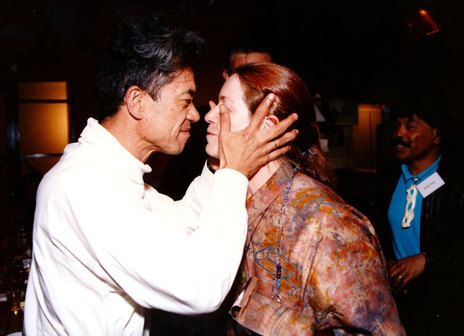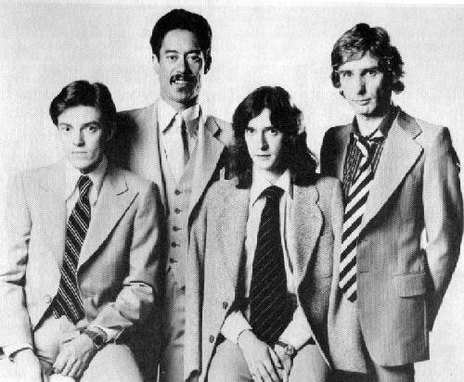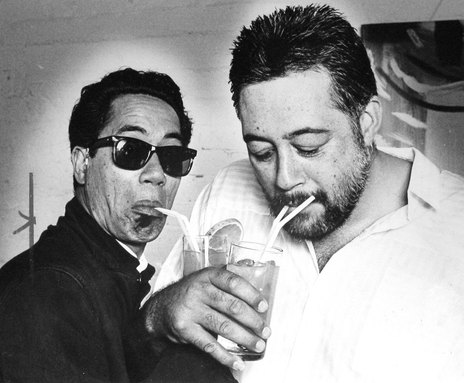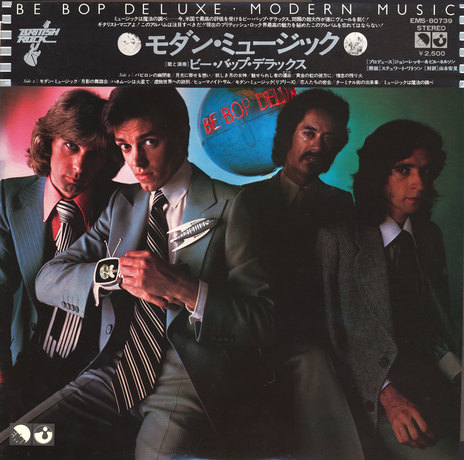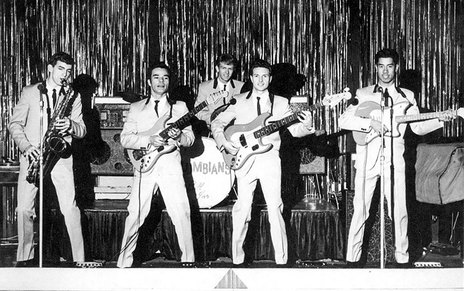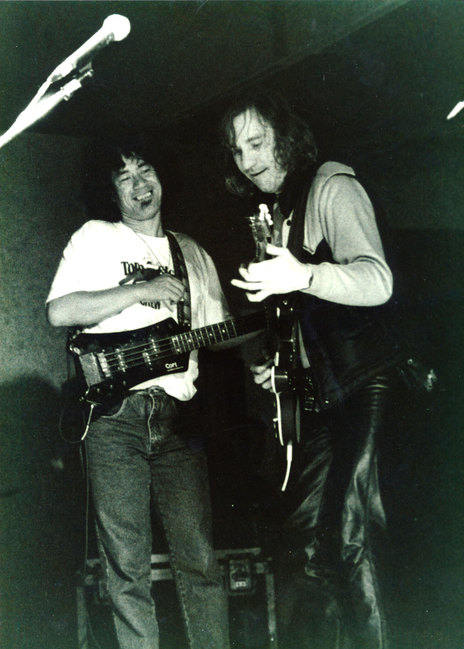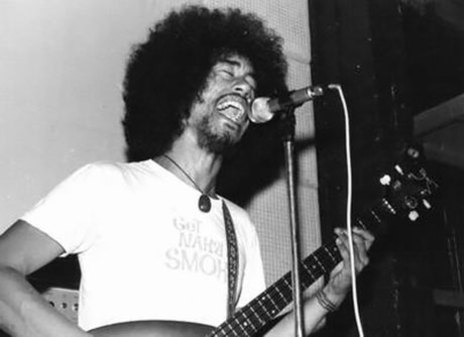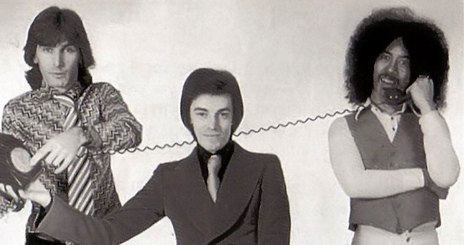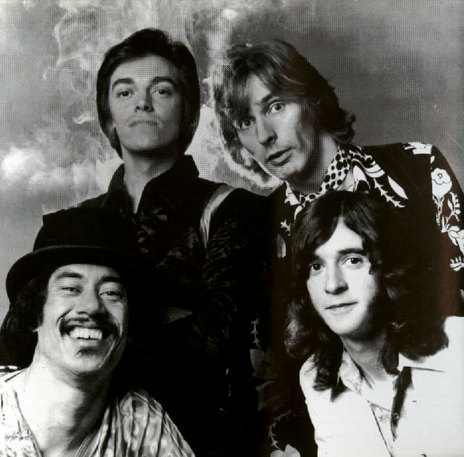I first met Charlie Tumahai in January 1971, backstage at the Myponga Music Festival in South Australia; we were introduced by drummer Laurie Pryor. He and Tumahai were members of a recently formed group, Healing Force.
There was a big buzz about Healing Force, A supergroup of Australian Prog-rock pioneers.
There was a big buzz about Healing Force, who were hailed as a supergroup and Australian pioneers of a genre some called progressive rock. Six months later, Healing Force released a landmark Australian recording, ‘Golden Miles’ (sung by Tumahai) but Tumahai moved on shortly after its release. A familiar story – between 1970 and 1974 he played in eight different bands.
I ran into Charlie sporadically after that first meeting, before he shifted to London and international success with Be Bop Deluxe. The next time I hooked up with him was in 1979, pub-crawling Auckland with mutual friend Sonny Day. Given his years in Britain, he'd picked up an accent. Along with his extravagant appearance, he came across like a character out of Minder. Know wot I mean?
Be Bop Deluxe was behind him but Charlie was still very much the star. He certainly looked like a star, turning every head in every bar we hit – a velvet-lined cape was draped over a caramel cashmere suit, blue satin shirt and floral tie, and a pair of snakeskin boots peeked out below. On his head he wore a fedora, which started out at a rakish angle but finished the night pulled tight over his head, tie discarded, the cape gifted to an old friend we had crossed along the way.
As it turned out, although Charlie returned to Britain for another six years, Be Bop Deluxe proved to be the highpoint of his international career. He once told me, “The first time I toured the States we were picked up from the airport in limousines. The last time we toured I grabbed a taxi.”
In 1985 Charlie returned to New Zealand and joined his cousins Dilworth Karaka and Maurice Watene in Herbs.
Charles Tura Tumahai was born 14 January 1949 at Ōrākei, the second of 11 children. His paternal grandfather, Francois, a Tahitian dance band musician, played in Auckland in the 1920s and never left. Francois married into Ngāti Whātua's Ōrākei community and fathered six children, including Charlie's father, also named Charles; Charlie's mother was of Ngāpuhi descent.
It was Charles Senior's brother George who took the Tumahai name to the country. In 1938, aged just six years old, he began appearing on Radio 1ZB's weekly Thea and Her Sunbeams; George was a Sunbeam. Following World War II George formed The Three Deuces, which also featured Charles Sr, with accompaniment by guitar great Johnny Bradfield. George Tumahai and His Tahitians was a popular act of the early 1950s and this was followed by series of hugely successful recordings, paired with singer Daphne Walker and backed by Bill Sevesi and His Islanders (‘Haere Mai’, ‘Hoki Mai’, ‘Tahi Nei Taru Kino’, ‘Maori Brown Eyes’).
Meanwhile, young Charlie Tumahai was growing up in Ōrākei (or Boot Hill, as it is affectionately called). Cousin and fellow Boot Hill kid Maurice Watene remembers, “Charlie had a really bad stammer. If we were playing hide-and-seek, it would take him ages to count to 20. The remarkable thing is that when he sang the stutter disappeared.”
Brought up in such a musical environment, music played a large part in the lives of the Boot Hill kids. “We would listen to the Hit Parade on the radio and memorise the songs," Watene remembers, “and then we would gather around one of the street lights on Moana Street and sing them.”
Young Charlie became proficient on piano, drums and guitar.
Aged between seven and 12, the kids, including Charlie, Maurice and guitarist Tuhi Timoti, were soon entertaining their elders at Ōrākei parties and activities. Although musical instruments were at a premium, Charlie became reasonably proficient on piano, drums and guitar. His first bass guitar, to become his instrument of choice, was adapted from a six-string guitar. In a nod towards Uncle George's own childhood, the family group was named The Sunbeams.
In 1958 The Sunbeams came second to the Howard Morrison Quartet at a Māori community centre talent quest. Maurice: “First prize was a fridge, second prize was a radiogram. We were happier with second prize.”
With an ever-changing line-up, The Sunbeams survived through to the mid-1960s. Phil Warren presented them and Benny Levin toured them. In 1961 Gilbert Tong, who'd established a Pacific tour circuit, flew them to Noumea for a week's work. They appeared several times at The Shiralee, second-billed to Max Merritt and The Meteors and Ray Columbus and The Invaders.
By 1964 Charlie had moved on, starting with The Columbians, who replaced Sonny Day's Sundowners at The Jive Centre. It was during this period when he made the shift to bass guitar.
In 1966 Charlie and his family moved to Tahiti, his grandfather's birthplace. Aged 17, he was truly bitten by the musical bug by now, and was soon playing with the Hotel Tahiti Orchestra. He played in New Caledonia and other Gilbert Tong destinations, and befriended one of his heroes, Sonny Day (seven years Tumahai's senior and, at 24, already a seasoned veteran).
In 1990 Tumahai told me, “It was all cabaret stuff, all pretty tame, middle of the road, the odd rock and roll song, but it was a great learning experience, the discipline required to do it day-in and day-out.” Charlie Tumahai had become a professional musician.
Within months he was recruited for Te Kiwis, a Māori showband.
The Tumahai family, Charlie included, returned to Auckland in 1968 and within months he was recruited for Te Kiwis, a Māori showband preparing to cross the Tasman. Te Kiwis hit the Sydney cabaret circuit and in 1969 they secured a three-month contract in Vietnam, backing Australian-based black American singer Wiley Reed. Back in Sydney, Tumahai left Te Kiwis and joined Multiple Balloon, another cabaret band, same supper club circuit. Middle of the road but very popular, Multiple Balloon released two singles. Tumahai's first recordings, they were ‘Fool On The Hill’ and ‘Girls' Song’ – think Sergio Mendez.
Tumahai stuck it out for the best part of a year but by mid-1970 he was getting sick of the cabaret routine. “I needed to stretch out. There was all this other music, Hendrix and the wilder stuff, which I was missing out on.”
Leaving Multiple Balloon, he joined Aesop's Fables, an already-established group who themselves had cabaret origins but, through a series of line-up changes, had morphed into a rockier act, not least due to the presence of Les Stacpool, one of the great Australian guitarists. Aesop's Fables disbanded three months after Tumahai's arrival and in October 1970 he joined Melbourne-based Nova Express, a large band in the vein of the then popular Blood Sweat & Tears. It was a fill-in position and just six weeks later Charlie was looking for work. But not for long, Healing Force was next.
Guitarist and main songwriter Lindsay Wells had recently departed Bakery, New Zealand keyboardist Mal Logan was from the recently defunct Rebels, and drummer Laurie Pryor was from The Twilights. Add in Tumahai's growing CV and you had “Australia's first supergroup”. "That was just media and promoters," Tumahai said later. “We were just four musicians exploring ideas.”
Wells and Tumahai shared lead vocals but it was Charlie's voice that graced the band's sole release, ‘Golden Miles’, Wells's take on life on the road. ‘Golden Miles’ has appeared on numerous compilations since its release, in Australia and further afield. Although not a massive hit nationwide, it made up for it in Melbourne, staying in the regional charts for five months. But within weeks of its release Tumahai had moved on.
The Chain was an ever-changing collective of Melbourne-based blues musicians. In the coming years all four Healing Force members spent time with The Chain – Tumahai's stint was typically brief, just four months. He was lured away by another Kiwi, Leo De Castro, to form Friends, with Tumahai playing percussion and sharing vocals with De Castro.
Tumahai stayed in Friends for six months, during which time a single was released. ‘B.B.Boogie’ plods along in a 12-bar fashion but the flipside, ‘Freedom Train’, written by Tumahai, has been proclaimed as another landmark Australian recording and features on a couple of compilations. Both songs feature Tumahai on lead vocals.
At the end of 1972 Charlie was back with Healing Force, staying long enough to perform at the Sunbury Festival in the new year (and be included on the subsequent triple-album) before that band imploded once more. Tumahai and keyboardist Mal Logan then formed the short-lived Alta Mira with NZ guitarist Tim Piper and drummer Tony Lunt.
Charlie Tumahai remained in London; back in Australia Mississippi evolved into the Little River Band.
Twelve months after Healing Force's reformation performance at Sunbury, Charlie Tumahai was back in yet another new band, Mississippi, already an established act with a handful of releases when he joined in December 1973. Ambitious, in May 1974 the band embarked on a proposed British tour, which turned into a fiasco with band members returning to Australia within weeks. Charlie Tumahai remained in London; back in Australia Mississippi evolved into the Little River Band.
In September 1974 Charlie Tumahai was unemployed and 18,000 km from home, with few friends and connections, and vying with thousands of like-minded others, determined to survive as a professional musician. “I wasn't stressed,” Charlie told me later, “I just wanted to work and preferably with some good players. I felt that I was ready and the various musical styles I'd played – cabaret, blues, soul, the 'progressive' stuff – had prepared me. I didn't have stars in my eyes or anything, I didn't know who Be Bop Deluxe were, I'd never heard of them.”
Be Bop Deluxe came out of West Yorkshire. Based around singer-guitarist-songwriter Bill Nelson, their 1971 independently-released solo album, championed by radio guru John Peel, led to EMI signing Nelson's newly-formed band in 1973. The following year's Axe Victim established the group without them breaking through. Nelson sacked the band and recruited a new line-up, which also didn't work out. Retaining only drummer Simon Fox and initially deciding not to add another keyboardist and work as a trio, Nelson placed an ad in Melody Maker for a bass-player.
Be Bop Deluxe straddled several genres of the era and were labelled Art Rock, Prog Rock, even Glam Rock.
Be Bop Deluxe straddled several genres of the era and were labelled Art Rock, Prog Rock, even Glam Rock. All labels aside, it was entirely Bill Nelson's musical vision although he allowed his rhythm section enough room to express themselves. A keyboardist, Andrew Clark, was hired to play on the Futurama album and subsequent tour, and by default became a fulltime member. There were no further line-up changes through to Nelson disbanding Be Bop Deluxe in 1978.
Three more Be Bop Deluxe studio albums and one live album followed and they toured incessantly, including annual USA tours, which failed to break the band in the larger market (hardly surprising, one tour saw them double-billed with Lynyrd Skynyrd).
But Charlie had no sooner joined Be Bop Deluxe when his troubles began. Deemed an alien by the Home Office, he was declined an extension on his work visa and ordered to leave the country. Keeping Charlie Tumahai in Britain was a continuing distraction throughout the rest of Be Bop Deluxe's career. To Bill Nelson's credit, he doggedly refused to replace him, even announcing that the entire band was moving to the south of France. In 1978, after three failed appeals, Tumahai was told that following a USA tour he would not be allowed back into Britain. A fourth appeal turned this over, by which time the band had indeed rented a villa in the south of France, but only to record their final album, Drastic Plastic, using The Rolling Stones' mobile studio. Just when Tumahai was getting used to his new immigration status, Nelson announced the band's demise.
Wasting no time, Tumahai immediately threw his lot in with a young Hastings (East Sussex) bunch called The Hollywood Killers. Their music was more power pop than punk but still with a far edgier sound than his previous band. It seemed like an odd move and lasted just a matter of months. In mid 1979 Charlie was recruited into The Dukes, whose members were well enough respected to earn a contract with Warner Music before they had played a gig.
The Dukes comprised Tumahai, guitarists Jimmy McCullough (ex Thunderclap Newman, Stone The Crows, and Wings) and Miller Anderson (Keef Hartley Band), keyboardist Ronnie Leahy (Stone The Crows). Three Scots and a Tahitian Māori.
A self-titled album was recorded and released within three months of formation, quite remarkable, with drumming handled by session players. The Dukes toured the UK as support act to Wishbone Ash to promote the album, but at tour's end, September 1979, McCullough overdosed on heroin. That was the end of The Dukes.
TUMAHai returned to New Zealand and joined Herbs in 1985.
In 1980 Tumahai had brief spells with two London bands, McKitty and Score, before he and fellow Dukes Anderson and Leahy formed Tandoori Cassette at year's end, adding drummer Barriemore Barlow (ex Jethro Tull) and guitarist Zal Cleminson (Sensational Alex Harvey Band). The band struggled through 15 hard months and when their sole release, ‘Angel Talk’, failed to sell, they split up.
Over the next three years Charlie Tumahai survived as an occasional session player (a Kate Bush recording is one I remember him mentioning) and the occasional nine to five job, including a spell on Portobello Road, running a vegetable store. He returned to New Zealand and joined Herbs in 1985. The boy from Boot Hill had returned home.
Charlie Tumahai remained with Herbs until his untimely death of a heart attack on 21 December 1995, aged just 46. Paying tribute, Bill Nelson said, “He had a soul, a very strong personality and he always grinned when he was playing, as if every note was an absolute joy.”
--
Read Charlie Tumahai: From Boot Hill to Be Bop and back
